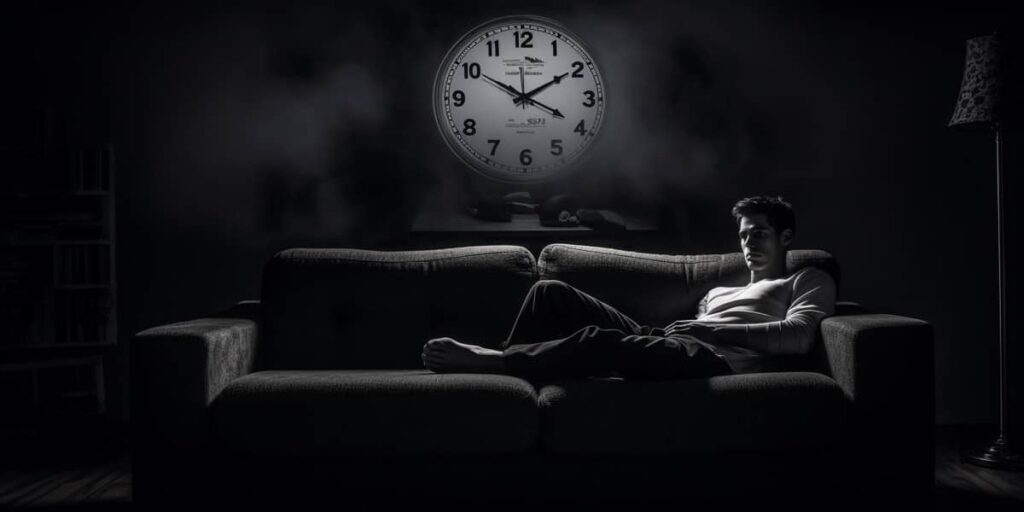Are you wondering if you’re addicted to porn? It’s a question that many individuals find themselves asking, as the accessibility and prevalence of pornography have increased in our digital age. Understanding the signs and symptoms of addiction can help shed light on your situation and guide you towards seeking the support you may need.
Porn addiction is characterized by compulsive sexual behavior involving excessive consumption of pornography, leading to negative consequences in various areas of life. Some common indicators include an intense desire or urge to view explicit material, difficulty controlling or limiting pornography use, neglecting responsibilities or relationships due to excessive time spent on pornographic content, experiencing withdrawal symptoms when attempting to decrease or stop consumption, and feeling distressed or anxious when unable to access pornography.
If you resonate with these descriptions and suspect that you may be struggling with a porn addiction, it’s important not to panic. Recognizing there might be an issue is a crucial first step in addressing it. Seeking guidance from mental health professionals who specialize in addiction can provide valuable insight and support as you navigate this challenging journey toward recovery. Remember, help is available, and there is no shame in reaching out for assistance when needed.
Signs and Symptoms of Porn Addiction
When it comes to determining whether or not you’re addicted to porn, there are a few key signs and symptoms to be aware of. While individual experiences may vary, here are some common indicators that could suggest a potential addiction:
- Increased Preoccupation: One of the telltale signs of porn addiction is an overwhelming preoccupation with pornography. You may find yourself constantly thinking about it, spending significant amounts of time searching for new content, or feeling restless when you can’t engage in watching it.
- Loss of Control: Another sign to look out for is a loss of control over your consumption habits. If you find that you’re unable to stop or cut back on your porn usage despite negative consequences in other areas of your life (such as work, relationships, or personal well-being), this could indicate a possible addiction.
- Escalation: Over time, individuals with porn addiction often require more explicit or extreme material to achieve the same level of arousal or satisfaction as before. This escalation in preferences can be a red flag for compulsive behavior and dependency.
- Neglected Responsibilities: Neglecting important responsibilities and obligations due to excessive porn use is another symptom commonly associated with addiction. This could include neglecting work tasks, social commitments, personal hygiene, or even self-care activities.
- Relationship Difficulties: Porn addiction can strain relationships and intimacy with partners. If your pornography consumption begins interfering with your ability to maintain emotional connections or engage in healthy sexual experiences with others, it may be worth considering if there’s an underlying issue at play.
Remember that these signs and symptoms should not be used as a definitive diagnosis but rather as guidance for self-reflection and seeking professional help if needed.
Understanding the Impact of Porn Addiction on Relationships
When it comes to porn addiction, its impact on relationships can be significant and far-reaching. Let’s delve into this complex issue and explore how it affects individuals and their connections with others.
- Strained Intimacy: Porn addiction can lead to a decrease in intimacy between partners. As one becomes more engrossed in consuming explicit material, it can create unrealistic expectations and fantasies that may not align with real-life experiences. This divergence can make it challenging to connect intimately with a partner, leading to feelings of dissatisfaction and distance.
- Trust Issues: Porn addiction can erode trust within a relationship. Constantly engaging in secretive behavior, such as hiding browsing history or lying about consumption habits, undermines the foundation of trust between partners. This breach of trust can lead to feelings of betrayal, insecurity, and jealousy.
- Emotional Disconnection: Excessive pornography use may result in emotional disconnection from one’s partner. Spending excessive time viewing explicit content takes away from meaningful interactions and communication within the relationship. Over time, this emotional detachment can strain the bond between partners and leave them feeling isolated.
- Performance Anxiety: Porn addiction has been linked to performance anxiety during sexual encounters with real-life partners. Constant exposure to highly staged and scripted scenarios depicted in pornography can create unrealistic expectations for performance and body image standards. This pressure often leads to anxiety about meeting these perceived ideals, causing difficulties in maintaining sexual satisfaction within the relationship.
- Communication Breakdown: Porn addiction can hinder effective communication between partners about their desires, boundaries, and concerns regarding sexuality. Engaging primarily with explicit material may make individuals less inclined to engage openly in discussions about their own needs or listen attentively to their partner’s desires – further exacerbating misunderstandings or unmet expectations.
Understanding these potential impacts is crucial for both individuals struggling with porn addiction as well as their partners who are navigating its effects on their relationships. By seeking professional help, engaging in open dialogue, and prioritizing emotional connection, couples can work towards healing and rebuilding trust while fostering healthier and more fulfilling relationships.
Please note that these examples are not an exhaustive list of all possible impacts of porn addiction on relationships but aim to provide a general understanding of the topic.
Ways to Determine if You’re Addicted to Porn
Determining whether or not you’re addicted to pornography can be a complex and personal process. It’s important to approach this topic with open-mindedness, honesty, and self-reflection. While only a professional can provide an official diagnosis, there are several indicators that may suggest a possible addiction. Here are some ways to help you determine if you might be struggling with porn addiction:
- Loss of Control: If you find it difficult or impossible to control your urges when it comes to consuming pornography, it could be a sign of addiction. This loss of control often manifests as spending excessive amounts of time searching for and viewing explicit material, despite negative consequences in other areas of life.
- Neglecting Responsibilities: One clear indication of addiction is neglecting important responsibilities in favor of engaging with pornography. This could include neglecting work or school obligations, relationships, personal hygiene, or social activities that were once enjoyable.
- Escalation: Addiction often involves the need for more intense experiences over time. If you find yourself constantly seeking out more extreme forms of pornography or spending increasing amounts of time exploring different genres and fetishes, it may indicate compulsive behavior associated with addiction.
- Withdrawal Symptoms: Similar to substance addictions, individuals addicted to porn may experience withdrawal symptoms when attempting to cut back or quit altogether. These symptoms can include restlessness, irritability, anxiety, difficulty concentrating, and strong cravings for sexual content.
- Negative Impact on Relationships: Pornography addiction can have detrimental effects on intimate relationships and interpersonal connections. If your excessive use of pornography has led to relationship conflicts or caused emotional distance between you and your partner(s), it’s essential to consider the possibility of addiction.
- Failed Attempts at Quitting: Many individuals who struggle with porn addiction report unsuccessful attempts at quitting or reducing their consumption without outside support or professional help. If you’ve repeatedly tried and failed to control your pornography use, it may be a red flag for addiction.
Remember, these signs are not definitive proof of addiction, but they can serve as valuable indicators. If you relate to several of these points and feel that your relationship with pornography is causing distress in your life, seeking support from a mental health professional or joining a support group could be beneficial steps towards understanding and addressing the issue.
It’s vital to approach this topic with self-compassion and without judgment. Addiction is a complex condition that affects individuals differently. By recognizing potential warning signs, you can take the necessary steps towards reclaiming control over your life and well-being.
The Role of Brain Chemistry in Porn Addiction
Understanding the role of brain chemistry in porn addiction is crucial to comprehending its impact on individuals. Our brains are intricate systems, and various chemical processes contribute to addiction behaviors. Here’s an exploration into how brain chemistry plays a significant role in porn addiction:
- Dopamine: The Feel-Good Neurotransmitter
Dopamine, often referred to as the “feel-good” neurotransmitter, plays a fundamental role in addiction, including porn addiction. When exposed to sexually explicit content, our brains release dopamine, creating pleasurable sensations and reinforcing the desire for more. - Reward Circuitry: Seeking Pleasure
The brain’s reward circuitry further reinforces addictive behaviors associated with pornography. When we engage with sexual stimuli, it activates this circuitry, leading to the release of dopamine and triggering feelings of pleasure and reward. - Desensitization: The Need for More Stimulation
Repeated exposure to pornographic material can lead to desensitization within the brain’s reward system. Over time, individuals may require more intense or novel content to experience the same level of pleasure they once did, leading them down a dangerous path of escalating consumption. - Neural Plasticity: Rewiring the Brain
Porn addiction can have profound effects on neural plasticity—the ability of our brains to adapt and change over time. With repeated exposure, certain neural pathways become strengthened while others weaken or atrophy. This rewiring can make it increasingly challenging for individuals struggling with addiction to break free from compulsive behaviors. - Cravings and Withdrawal Symptoms
As with any form of addiction, cravings and withdrawal symptoms are common experiences among those battling porn addiction. When individuals try to abstain from consuming explicit content, they may encounter intense cravings accompanied by psychological distress such as anxiety or irritability.
Understanding these underlying mechanisms behind porn addiction sheds light on why breaking free from its grasp can be so challenging. It emphasizes the importance of seeking support and professional help when dealing with this addiction.
Remember, each person’s journey is unique, and there may be additional factors involved in individual experiences of porn addiction. However, grasping the role of brain chemistry provides valuable insights into why it can be such a pervasive and difficult issue to overcome.
How to Seek Help for Porn Addiction
If you find yourself questioning whether you may be addicted to porn, it’s important to know that seeking help is a courageous step towards recovery. There are various resources available that can provide support and guidance on your journey. Here are a few options to consider:
- Professional Therapy: Engaging in therapy with a licensed counselor or therapist who specializes in addiction can be incredibly beneficial. They can help you explore the underlying factors contributing to your addiction, develop coping mechanisms, and provide ongoing support throughout your recovery process.
- Support Groups: Joining a support group specifically tailored for porn addiction can offer a sense of community and understanding from individuals who have faced similar challenges. These groups often provide a safe space for sharing experiences, receiving encouragement, and learning strategies for overcoming addiction.
- Online Resources: The internet offers an abundance of online resources such as forums, websites, and educational materials dedicated to helping individuals overcome porn addiction. These resources can provide valuable information, tips, and techniques that may assist you in navigating your recovery.
- Accountability Partners: Having someone you trust hold you accountable during your journey can greatly increase your chances of success. An accountability partner could be a close friend or family member who understands the struggles associated with addiction and is committed to supporting your recovery goals.
- Self-Help Techniques: Exploring self-help techniques like mindfulness practices, journaling, exercise, and engaging in hobbies or activities that promote well-being can also play an essential role in overcoming porn addiction.
Remember that seeking help is not a sign of weakness but rather demonstrates strength and determination to improve your overall well-being. Each person’s journey towards recovery is unique; therefore, finding the right combination of resources that resonate with you is crucial.
By reaching out for assistance through professional therapy, support groups, online resources, accountability partners, and incorporating self-help techniques into your daily routine, you’ll increase your chances of overcoming porn addiction and achieving a healthier, more fulfilling life.
Coping Strategies for Overcoming Porn Addiction
Dealing with a porn addiction can be challenging, but there are coping strategies that can help you overcome it. Here are some effective approaches to consider:
- Seek professional help: Consider reaching out to a therapist or counselor who specializes in addiction. They can provide guidance, support, and personalized strategies to address your specific situation.
- Build a support network: Surround yourself with understanding and supportive individuals who can offer encouragement along your journey towards recovery. This could include friends, family members, or even joining a support group where you can share experiences and learn from others facing similar challenges.
- Develop healthier habits: Replace the time spent engaging in pornography with positive activities that contribute to your overall well-being. Engage in physical exercise, pursue hobbies, read books, or learn new skills to divert your attention away from triggers and promote personal growth.
- Identify triggers and create boundaries: Reflect on the situations or emotions that lead you towards pornography use. By recognizing these triggers, you’ll be better equipped to avoid them or establish healthy boundaries around them. For example, if late-night internet browsing is a trigger for you, consider implementing an electronics curfew before bed.
- Practice self-care: Prioritize self-care activities that promote relaxation and stress reduction as part of your recovery process. Engaging in mindfulness exercises like meditation or deep breathing techniques can help manage cravings and increase self-awareness.
Remember that overcoming any addiction takes time and effort – progress may not always be linear but persisting through setbacks is crucial for success on this journey towards recovery.
Building Healthy Habits and Breaking the Cycle of Addiction
When it comes to breaking free from a porn addiction, building healthy habits is crucial. It’s not an easy journey, but with determination and the right strategies, you can regain control of your life and create a healthier relationship with sexuality. Here are a few examples of how you can build those habits and break the cycle of addiction:
- Establishing a Support System: Surround yourself with people who understand your struggle and are supportive of your desire to change. Seek out support groups or therapy sessions where you can share your experiences, learn from others, and receive guidance from professionals who specialize in addiction recovery.
- Setting Clear Boundaries: Define what is acceptable behavior for yourself when it comes to consuming adult content. Create specific rules that align with your values and goals, such as limiting screen time or avoiding certain triggers. Communicate these boundaries to yourself and others so that everyone involved understands what is expected.
- Finding Alternative Activities: Porn addiction often stems from seeking pleasure or escape through sexual stimuli. By finding alternative activities that bring you joy or help alleviate stress, you can redirect your focus away from pornography. Engage in hobbies like painting, playing an instrument, exercising, or spending quality time with loved ones.
- Developing Healthy Coping Mechanisms: Many individuals turn to pornography as a way to cope with difficult emotions or situations. Instead of relying on unhealthy outlets, explore healthier coping mechanisms such as deep breathing exercises, journaling thoughts and feelings, practicing mindfulness meditation, or talking through challenges with a trusted friend or therapist.
- Practicing Self-Care: Taking care of yourself physically and emotionally is essential during recovery. Make sure to prioritize self-care activities like getting enough sleep, eating well-balanced meals, exercising regularly, practicing good hygiene habits, and engaging in activities that promote relaxation and stress reduction.
Remember that breaking the cycle of addiction takes time and effort. It’s important to be patient with yourself and celebrate small victories along the way. By building healthy habits, seeking support, and staying committed to your recovery journey, you can overcome a porn addiction and cultivate a fulfilling life centered around genuine connection and personal growth.
(Note: The above information is not intended as professional advice. If you are struggling with addiction, please consult with a qualified healthcare professional or addiction specialist for personalized guidance.)
Conclusion
In summary, determining whether or not one is addicted to pornography can be a complex and subjective matter. It’s important to approach this question with honesty, self-awareness, and an understanding of the potential impact that excessive porn consumption can have on one’s life.
Here are a few examples that may help shed light on whether you might be dealing with a potential addiction:
- Compulsive behavior: If you find yourself consistently unable to control your urge to watch pornography, even when it interferes with other aspects of your life such as work, relationships, or personal responsibilities, it could be indicative of an addiction.
- Escalation: Another sign of addiction is when the amount or intensity of pornographic material you consume continuously increases over time. This can lead to a diminishing return in terms of satisfaction and the need for more explicit content to achieve the same level of arousal.
- Neglected interests: If you notice that your hobbies, social activities, or personal goals are being neglected due to excessive time spent consuming pornography, it may suggest an unhealthy attachment or dependency.
- Emotional distress: Experiencing feelings of guilt, shame, anxiety, or depression related to your porn usage can also indicate that there is a deeper issue at play. These negative emotions often arise from conflicting values and internal struggles.
- Relationship problems: Pornography addiction can strain relationships by creating unrealistic expectations about sex and intimacy. If your partner expresses concern or dissatisfaction with your porn habits impacting your connection and communication within the relationship, it’s worth reflecting on whether there may be addictive tendencies involved.
Please note that these examples are not definitive proof of addiction but rather indicators that warrant further exploration and consideration. It’s always advisable to seek professional help if you suspect that you may have developed an unhealthy dependence on pornography.
Remember, self-reflection and seeking support from loved ones or professionals can go a long way in addressing any concerns related to addiction.



